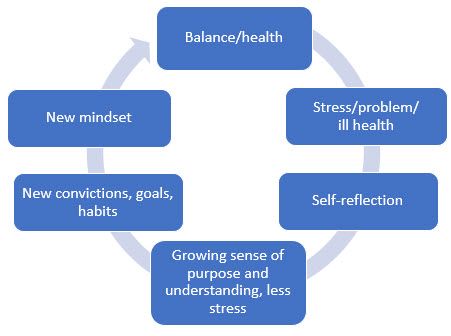Promoting health through guided self-reflection

At the Alpstein Clinic in Gais, the promotion of health is our primary concern. Here, the focus is on the individual as a whole. Prevention and recovery go hand-in-hand with the consideration of all interactions of body, mind and soul. Our patients are actively involved in all phases of recovery; their opinion is very important to us.
Psychological counselling is not primarily about learning to avoid diseases. The goal is rather to find and process the root causes of a disease. The main cause of any illness is stress, especially emotional stress. Such stressful moments can lie in the distant and sometimes unconscious past. Of course, it is also important to consider the current life situation. Illness is an attempt by the organism to live with these sources of stress and at the same time to draw our attention to the fact that we have to process something internally in order to create harmony, and in order for health to be restored.
The goals of psychological counselling
In our psychological consultations, we support our patients in their holistic understanding of their own health vs. illness. It is very important to us to accompany those who are affected out of the victim role, and therefore we pursue several goals at the same time:
- Awareness and processing of repressed wrong decisions, assumptions, attitudes, positions, or determinations
- Revising destructive feelings of guilt
- Processing old traumas
- Understanding family constellation processes and reorganizing them in a solution-oriented way
- Recognizing personality traits and integrating these into everyday life
- Resuming and completing emotional processes
- Working on self-image and self-confidence
- Discovering self-healing power
- Giving the body targeted self-healing inputs
- Improving people skills, to minimize misunderstandings and strengthen relationships
- Better understanding and active shaping of one’s own roles in the family and society
- Actively reducing stress, taking destructive attitudes and habits step by step.
The preferred method to achieve these goals of recovery support and prevention, which are set together with the patient, is getting to know and practice coached self-reflection.
Self-reflection – the ability to think about yourself
Self-reflection is the activity of thinking about oneself. This means analyzing and questioning your thoughts, feelings and actions, with the aim of finding out more about yourself. In doing so, we can not only question ourselves as an individual, but also as part of a system, for example as part of a family, a team or society. Self-reflection centres on precise perception and expansion of consciousness.
By employing self-reflection, we can analyze and solve problems and crises in every area of life. A crisis can be caused by external or internal dynamics. A disease is a clear indication that something in our outer and/or inner life is no longer in order, and as a consequence, we are prompted to overcome this obstacle. Anyone who is able to reflect on a regular basis, is promoting their health, because then they are able to recognize even small discrepancies and stresses quickly, and through new decisions and adjustments, bring themselves back into balance before an illness breaks out. Successful self-reflection makes use of multiple techniques and perspectives. We need an opening of our perception and an increased awareness of often hidden dynamics, so that we can understand better and then act purposefully.

Health promoting self-reflection cycle
The following list shows selected perspectives and theoretical approaches, which are inclusively applied in self-reflection. As such, it is the patient, with his or her resources, that is placed at the center, rather than a theory. This means that each session is tailor-made and takes its individual course, often resulting in a sense of effortless meaningfulness and easy-to-follow steps towards a solution:
- Depth psychology and trauma work
- Behaviorism and learning psychology
- Developmental psychological approaches
- Cognitivist approaches and imagination
- Creativity research approaches
- Approaches to stress research and salutogenesis
- Humanist psychology and pedagogy
- Systemic approaches
- Couple psychological approaches
- Psychosomatic and body integration approaches
- Positive psychology and resilience
- Mindfulness and spirituality
At the Alpstein Clinic you are in good hands
At the Alpstein Clinic you will feel well looked after, individually cared for on all levels of being: physical, mental and emotional, so that your self-healing powers are effectively supported. In our psychological consultations, which, wherever possible, are included as standard in our approach (4th pillar: harmonization and consciousness), you learn concretely what it means to be able to consciously influence your own illness/health and gain some techniques for self-help. Ultimately, you will want to make new decisions that will give more meaning, joy and health to your life!
Would you like to learn more about the possibilities of self-reflection in a first conversation with us? Take a few moments to complete the medical questionnaire and make an appointment now.